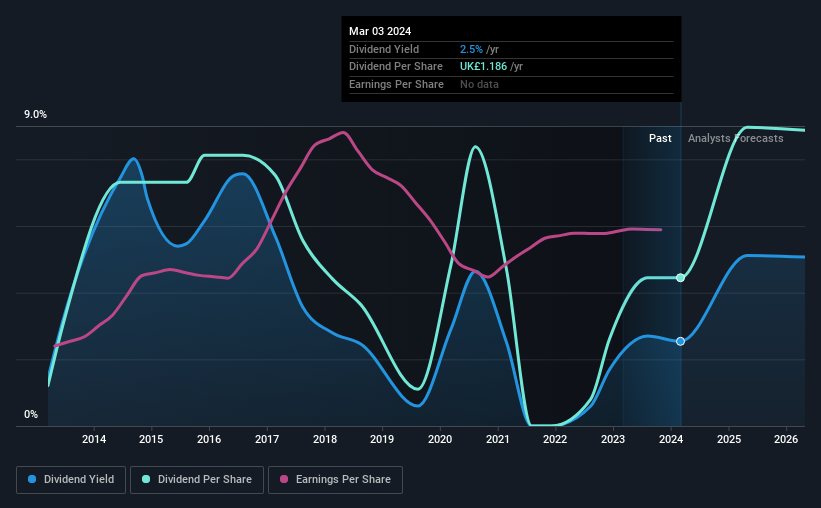- United Kingdom
- /
- Consumer Durables
- /
- LSE:BKG
Berkeley Group Holdings' (LON:BKG) Dividend Is Being Reduced To £0.33
The Berkeley Group Holdings plc (LON:BKG) is reducing its dividend from last year's comparable payment to £0.33 on the 29th of March. This means that the dividend yield is 2.5%, which is a bit low when comparing to other companies in the industry.
Check out our latest analysis for Berkeley Group Holdings
Berkeley Group Holdings' Dividend Is Well Covered By Earnings
Even a low dividend yield can be attractive if it is sustained for years on end. However, Berkeley Group Holdings' earnings easily cover the dividend. This means that most of its earnings are being retained to grow the business.
EPS is set to fall by 7.2% over the next 12 months. Assuming the dividend continues along recent trends, we believe the payout ratio could be 21%, which we are pretty comfortable with and we think is feasible on an earnings basis.

Dividend Volatility
Although the company has a long dividend history, it has been cut at least once in the last 10 years. The annual payment during the last 10 years was £0.325 in 2014, and the most recent fiscal year payment was £1.19. This works out to be a compound annual growth rate (CAGR) of approximately 14% a year over that time. It is great to see strong growth in the dividend payments, but cuts are concerning as it may indicate the payout policy is too ambitious.
Dividend Growth May Be Hard To Achieve
With a relatively unstable dividend, it's even more important to evaluate if earnings per share is growing, which could point to a growing dividend in the future. It's not great to see that Berkeley Group Holdings' earnings per share has fallen at approximately 5.0% per year over the past five years. Declining earnings will inevitably lead to the company paying a lower dividend in line with lower profits.
In Summary
In summary, dividends being cut isn't ideal, however it can bring the payment into a more sustainable range. The payments haven't been particularly stable and we don't see huge growth potential, but with the dividend well covered by cash flows it could prove to be reliable over the short term. This company is not in the top tier of income providing stocks.
Investors generally tend to favour companies with a consistent, stable dividend policy as opposed to those operating an irregular one. Still, investors need to consider a host of other factors, apart from dividend payments, when analysing a company. To that end, Berkeley Group Holdings has 2 warning signs (and 1 which doesn't sit too well with us) we think you should know about. Looking for more high-yielding dividend ideas? Try our collection of strong dividend payers.
Valuation is complex, but we're here to simplify it.
Discover if Berkeley Group Holdings might be undervalued or overvalued with our detailed analysis, featuring fair value estimates, potential risks, dividends, insider trades, and its financial condition.
Access Free AnalysisHave feedback on this article? Concerned about the content? Get in touch with us directly. Alternatively, email editorial-team (at) simplywallst.com.
This article by Simply Wall St is general in nature. We provide commentary based on historical data and analyst forecasts only using an unbiased methodology and our articles are not intended to be financial advice. It does not constitute a recommendation to buy or sell any stock, and does not take account of your objectives, or your financial situation. We aim to bring you long-term focused analysis driven by fundamental data. Note that our analysis may not factor in the latest price-sensitive company announcements or qualitative material. Simply Wall St has no position in any stocks mentioned.
About LSE:BKG
Berkeley Group Holdings
The Berkeley Group Holdings plc, together with its subsidiaries, builds homes and neighbourhoods in the United Kingdom.
Excellent balance sheet and fair value.
Similar Companies
Market Insights
Community Narratives



